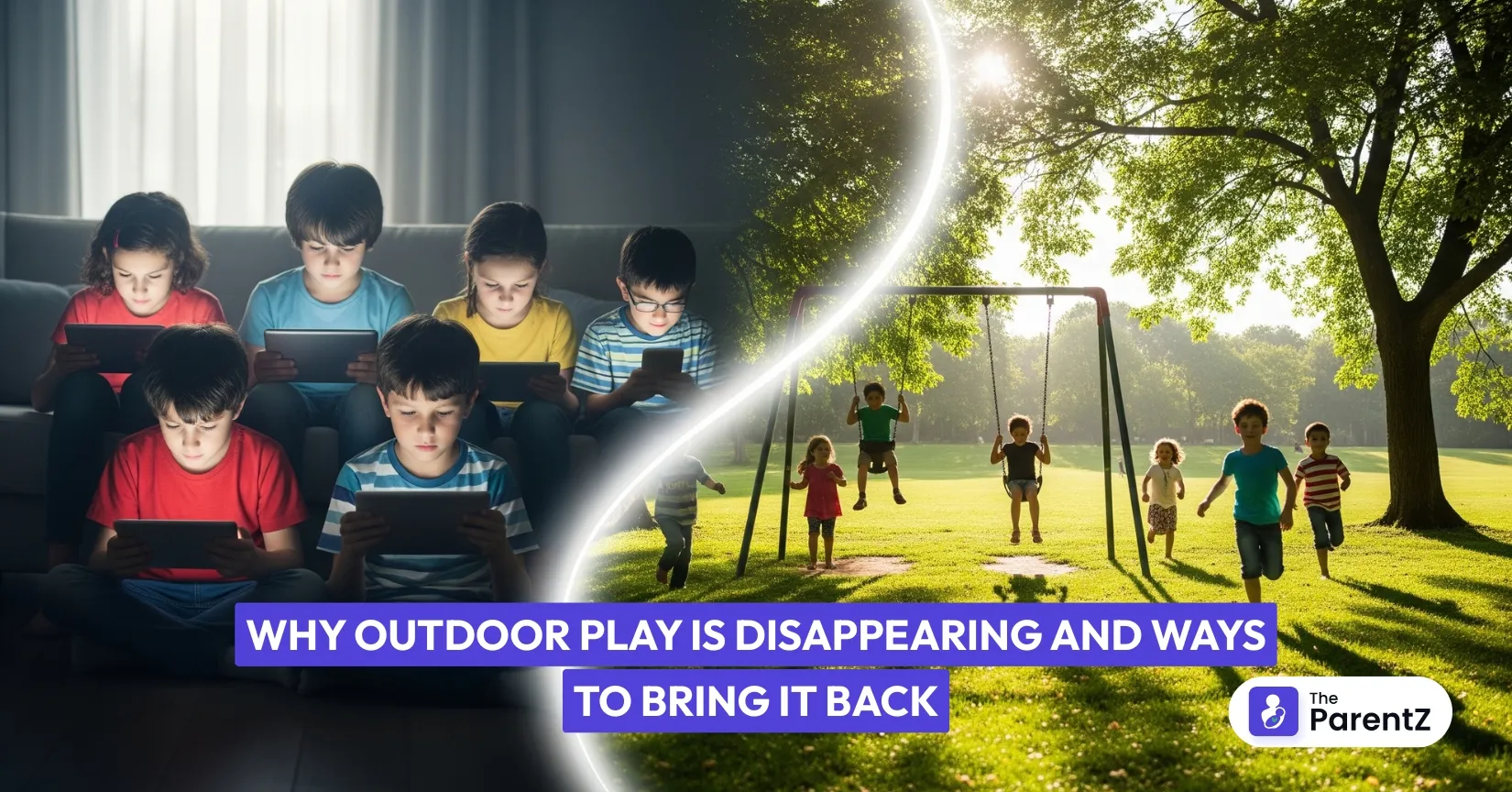Remember when summer meant scraped knees, dirt under fingernails, and coming home only when the streetlights came on? If you're a parent today, you've probably noticed that your kids would rather stay inside with their screens than explore the world outside your front door.
You're not imagining it. Outdoor play really is disappearing, and it's happening fast. Kids today spend 90% of their time indoors. Even prisoners spend more time outdoors than most children, and that should worry us all.
Why Outdoor Play Vanished
Technology Took Over
Screens are everywhere. Tablets, phones, gaming consoles, and smart TVs have become our kids' best friends. These devices are designed to be addictive, releasing dopamine hits that make everything else seem dull in comparison. Why would a child want to chase butterflies when they can chase Pokémon on their phone?
The pandemic made this worse. When schools closed and playgrounds were off-limits, screens became our savior and babysitter. But what started as a temporary solution became a permanent habit.
Fear Changed Everything
Remember when your mom told you to "be home before dark"? Today's parents live with constant anxiety about stranger danger, kidnapping, and accidents. We've become so scared of the "what ifs" that we keep our kids safely locked inside.
The media doesn't help. Every tragic story gets amplified, making rare dangers feel common. Meanwhile, we've forgotten that the real danger might be the sedentary lifestyle we're creating instead.
Cities Aren't Built for Kids Anymore
Our neighborhoods have changed. There are fewer sidewalks, more traffic, and less green space. Many families live in apartments without backyards. Playgrounds are either too far away or feel unsafe.
Schools have also cut back on recess time, focusing more on test scores than letting kids be kids. Some schools have even banned activities like tag or climbing trees because they're worried about lawsuits.
Parents Are Busier Than Ever
Between work, commuting, and endless activities, families barely have time to breathe. When we finally get home, it's easier to let kids entertain themselves with screens while we catch up on chores or collapse on the couch.
Many parents also feel uncomfortable outdoors themselves. If you grew up playing video games instead of climbing trees, how do you teach your kids to love nature?
The Hidden Costs of Indoor Living
Physical Health Problems
Kids today are facing health issues we never saw before. Childhood obesity has tripled since the 1970s. Vitamin D deficiency is common because kids aren't getting enough sunlight. Vision problems are skyrocketing from too much close-up screen time.
Without outdoor play, children miss out on the natural exercise that builds strong bones, muscles, and coordination. They're not developing the balance and spatial awareness that comes from running, jumping, and climbing.
Mental Health Struggles
Depression and anxiety in children have reached crisis levels. Kids are stressed, overwhelmed, and disconnected from the natural world.
Outdoor play is nature's antidepressant. Sunlight boosts mood, fresh air clears the mind, and physical activity releases endorphins. When we take away outdoor time, we're taking away one of the most powerful tools for mental wellness.
Social Skills Are Suffering
Real-world play teaches kids how to negotiate, share, resolve conflicts, and read body language. These skills don't develop through online interactions. Children are struggling with face-to-face communication and finding it harder to make genuine friendships.
Creativity Is Dying
A stick can become a sword, a magic wand, or a fishing pole, but only if kids learn to use their imagination. Outdoor play forces creativity because there are no preset rules or levels to complete. Children learn to entertain themselves and think outside the box.
Bringing Outdoor Play Back: Practical Solutions for Families
Start Small and Simple
You don't need a perfect backyard or mountain hiking trails. Start with what you have:
- Sidewalk adventures: Take walks around your neighborhood. Let kids stop to examine bugs, collect leaves, or draw with chalk.
- Balcony gardens: Even a small outdoor space can become magical with some plants to water and observe.
- Window exploration: Open windows, listen to birds, feel the wind, and watch clouds.
Make It a Family Priority
- Schedule outdoor time: Put it on the calendar like any other important appointment. Treat it as non-negotiable.
- Lead by example: If you're always on your phone, your kids will be too. Show them that you value outdoor time by participating.
- Create screen-free zones: Set certain times or places where devices aren't allowed.
Embrace Boredom
When kids complain they're bored outside, resist the urge to entertain them or hand them a device. Boredom is the birthplace of creativity. Give them time to figure it out themselves.
Connect with Other Families
- Find your tribe: Look for other parents who value outdoor play. Organize regular meetups at parks or playgrounds.
- Start a walking group: Meet other families for evening walks or weekend hikes.
- Create outdoor playgroups: Rotate hosting simple outdoor activities between families.
Work with Your Community
- Advocate for better spaces: Attend city council meetings to push for more playgrounds, bike paths, and green spaces.
- Support outdoor programs: Look for nature centers, scouting groups, or outdoor camps in your area.
- Volunteer: Help maintain local parks or organize community clean-up days that kids can join.
Make It Weather-Appropriate
Don't let the weather be an excuse. Invest in proper gear:
- Rain boots and jackets for puddle jumping
- Warm clothes for winter exploration
- Sun hats and water bottles for hot days
Reframe Risk
Instead of asking "What if something bad happens?" try asking "What if nothing happens?" The biggest risk might be raising children who are afraid of the world around them.
Start with calculated risks in controlled environments. Let kids climb a tree while you spot them. Allow them to use real tools with supervision. These experiences build confidence and judgment.
Conclusion
Bringing back outdoor play won't happen overnight, but small changes can make a big difference. Start with 15 minutes outside each day. Build from there.





Be the first one to comment on this story.